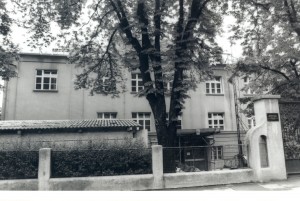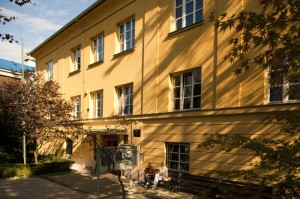Today’s University of Applied Health Sciences was established in Zagreb in 1966 by the decision of the Association of Croatian Health Institutions under the name of the Advanced School of Nursing and Health Technicians due to the need for a higher level of education of previously secondary-school educated health professionals. At that time, it was the only higher education institution in Croatia that carried out education of hospital and visiting nurses, radiologic technologists, environmental health and laboratory technicians at what was then higher education level. In 1968, the education of students at the study program of Physiotherapy began, and that of occupational therapists began in 1986.
From its establishment until 1998, the duration of the study programmes for all courses was two years or four semesters, with the curricula directed towards the acquisition of theoretical knowledge and practical skills, and with the emphasis on mastering practical skills needed for everyday work in health care practice. Practical training took place at teaching sites of collaborative health care institutions and other types of institutions – health centres, general and specialised hospitals, clinical hospitals, retirement homes, and the like. In addition to the courses in Zagreb, study programs in nursing were also organised on a permanent basis in Split, and occasionally in Osijek and Požega, and courses for radiologic technologists were offered in Split and Varaždin.
For several years a study in physiotherapy was organized in Igalu (Montenegro). It started in 1976 as a regional study of the Advanced School of Nursing and Health Technicians, and it later became the Faculty of Applied Physiotherapy in Igalu. The study for all study programs was organised as full-time and part-time study.
The beginnings of schooling at the Advanced School of Nursing and Health Technicians were indeed modest. The main premises covering about 20 square meters were located at the rented premises of the Centre for the Protection of Mothers and Children, in Klaićeva street. Lectures were held at rented premises on different locations in Zagreb. Teaching staff was engaged solely on a part-time basis and came mainly from the School of Medicine, University of Zagreb.
In 1970, the premises at Gajeva ulica 49/1 spanning an area of 140 m2, were purchased using the institution’s own funds, and this initial capital outlay using a long-term loan led to the purchase of the current building accommodating the University of Applied Health Sciences at Mlinarska cesta 38 in Zagreb. A good start in its autonomous development was abruptly terminated during the reform of the education system in 1984, which resulted in the merger with the School of Medicine at University of Zagreb due to rationalisation of staff, premises and equipment.
The loss of autonomy during the next 13 years, until it was regained in 1996, slowed the development of the study programs, and in particular the University’s ability to form its own teaching staff. At that time, all teaching was under the auspices of the departments of the School of Medicine in Zagreb, which was generally reluctant to expand any study program content, and was particularly reluctant to extend the duration of the programs. An opportunity to expand the duration of the study programs from two to three years came only with the split from the School of Medicine in 1996 and the establishment of the School of Health Studies in Zagreb in 1996.
University of Applied Health Sciences today
The Higher Education Act of 1993 stipulated that professional study programs could only be taught temporarily and in exceptional circumstances at faculties, but were to be taught as a rule at colleges and polytechnics. This initiated the process of establishing new, autonomous colleges and polytechnics. Accordingly, after their dissolution in the mid-eighties, the opportunity for autonomous development of polytechnics and colleges in Croatia appeared once again.
The formal independence of and splitting from the School of Medicine in Zagreb, occurred in 1996 with the establishment of the School of Health Studies in Zagreb after the passing of an Ordinance by the Croatian Government that came into force on 24 May 1996 and its publication in the Official Gazette (no. 41/96).
Immediately after that, there was an attempt to execute already developed proposals for new three-year courses in all study programs, where after they were positively rated by the National Council, the competent Ministry issued accreditations, and the study programs in all the courses of the 1999/2000 academic year commenced as three-year study programs. Accordingly, the University of Applied Health Sciences introduced the first level of the Bologna process four years earlier than all other related higher education institutions, and it should be noted that immediately after the introduction of the Bologna process, it was then possible to establish the first specialist graduate professional study program at the University of Applied Health Sciences.
The Croatian Government adopted the Ordinance on Amendments to the Ordinance on the Establishment of the Universityof Applied Health Sciences, which entered into force on 25 March 2005 upon its publication in the Official Gazette (no. 39/2005), and after which the School of Health Studies in Zagreb was renamed into the University of Applied Health Sciences.
Reforms relating to teaching staff were quickly initiated, since most of the lecturers, following the split, remained at the School of Medicine. Job vacancies were published for the purpose of recruiting new teaching staff, but in a limited number and not as required, since then, as is now the case, a quota was imposed due to the Croatian Government’s decision on temporarily banning the employment of persons in the public and civil service. Besides the lack of teaching staff, a great and lasting problem at the University of Applied Health Sciences was the lack of sufficient space on the premises for the growing scope of teaching activities, and the increasing number of students and broader professional and scientific activities. This was resolved by adding two extensions to the building in Mlinarska in 2002, and expanding the premises at Ksaver where the offices for the lecturers and ten lecture halls of various sizes were constructed.
Therefore, the new Bologna process of higher education provided all the study programs at the University of Applied Health Sciences a way out of higher-education dead end that had lasted for years. The study programmes organised according to the principles of the Bologna Declaration and ECT S credit system started in the 2005/2006 academic year. Specifically, in addition to the undergraduate level of three year studies, it also allowed for the continuation of education at the specialist graduate professional studies for another two more years, which was previously a privilege offered only to students of university study programs. Once again, we emphasize that owing to the fact that the University of Applied Health Sciences in the 1999/2000 academic year had already introduced a three-year studies, immediately after accepting the new Bologna process in two cycles (3+ 2), it became possible to start organising the specialist graduate professional studies, because there were eligible graduates who had completed the three-year study. The first specialist graduate professional study programs were Management in Nursing, Public Health, Physiotherapy and Environmental Health Engineering.
The University of Applied Health Sciences possesses permanent accreditation for the following study programs:
Undergraduate professional study programs
Physiotherapy
Laboratory Medical Diagnostics
Radiological Technology
Occupational Therapy
Environmental Health Engineering
Nursing
Specialist graduate professional study programs
Management in Nursing
Public Health
Physiotherapy
Environmental Health Engineering
Clinical Nursing
Psychiatric Nursing
Study programs at the University of Applied Health Studies are organized as full-time and part-time studies. and irregular. Theoretical classes are held at the premises of the University in Mlinarska 38, and Ksaver 209, and practical training is held at various 50 collaborative and related institutions which are contracted teaching sites of the University of Applied Health Sciences.







